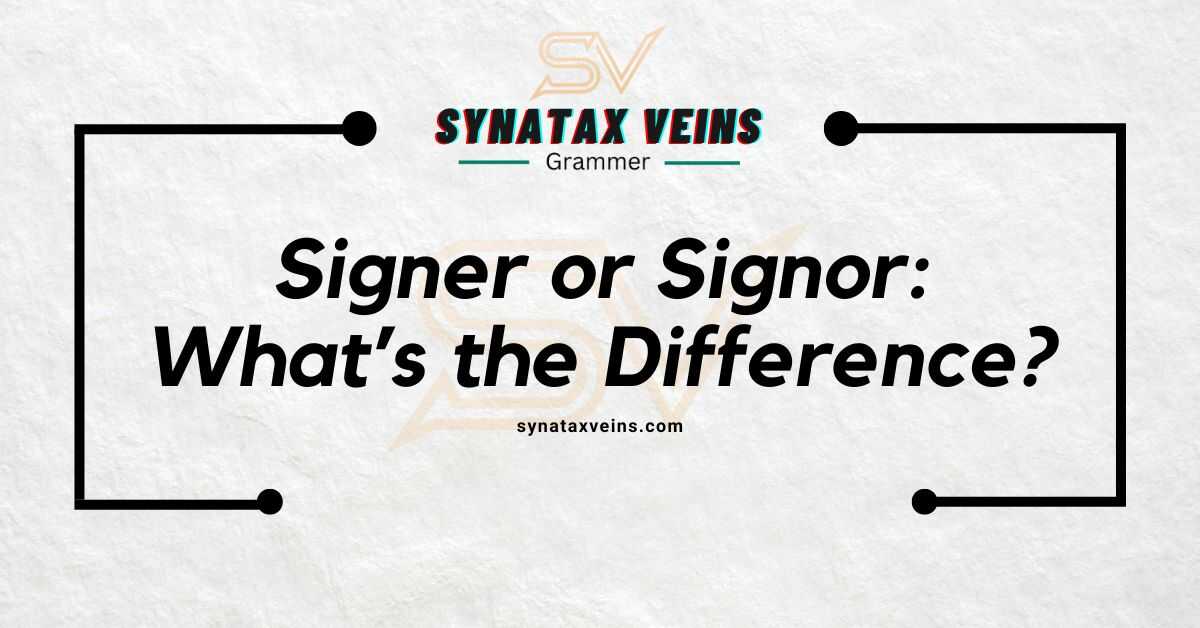When it comes to Signer or Signor, many people find themselves puzzled about which term to use. These two words may sound similar, but they have very different meanings and uses in language.
We will break down the difference between Signer and Signor, exploring their origins, how they are used in different contexts, and the mistakes people commonly make when using them.
Quick Summary
To sum it up, Signer refers to someone who signs a document, particularly in legal and official settings. It’s a common term in legal documents, contracts, and bank authorization. On the other hand, Signor is an Italian honorific title, used to show respect, much like “Mister” in English. It’s mainly used in formal address in Italian culture and business agreements.
Understanding Signer or Signor
Both Signer and Signor have distinct roles in language. The Signer is essential in legal documents and official paperwork. This person is responsible for signing contracts, approving legal agreements, or validating official endorsement. On the other hand, Signor is a term rooted in Italian etiquette. It is used to address men with respect in formal communication. Understanding the cultural respect behind Signor is key to using the term correctly.
Origins of the Signer
The word Signer comes from the Latin word signare, meaning “to sign.” Over time, it evolved into the English word Signer, which refers to a person who signs something. The signer’s role is significant in legal agreements and official documents like notarized documents or business contracts. The Signer meaning is tied to the validation of an official agreement or signature requirement.
Origins of the Signor
Signor, on the other hand, is derived from the Italian word signore, meaning “lord” or “master.” It is a title of respect and a form of formal address used in Italy to show honor, similar to Mister in English. The use of Signor reflects Italian cultural distinction and is often seen in business contracts or professional writing. Understanding this Italian honorific is essential when addressing someone with respect in Italian-speaking contexts.
Common Mistakes and How to Avoid Them
One of the most common mistakes is using Signor when you mean Signer in legal or business settings. For example, Signor should never be used to refer to someone who is signing a document in a legal document or business agreement. Always remember that Signer refers to a person who signs something, while Signor is a formal title used in Italian honorifics.
Trick to Remember the Difference Between Signer or Signor
A helpful trick is to associate the word Signer with signing contracts and legal documents. Think of a Signer as someone who makes their mark on a piece of paper. On the other hand, think of Signor as a title of respect, used in formal interactions and Italian formal address.
Signer: Definition and Usage
A Signer is a person who affixes their signature to a document, typically for official purposes. Whether it’s a bank authorization, a contract signing, or validating an official agreement, the Signer plays a crucial role in document validation. Signers are often required to be present in business deals to confirm the signature requirement.
Signor: The Italian Cultural Honorific
In contrast, Signor is used to show respect in Italian culture. It is an honorific title used to address men, similar to how we use Mister in English. For example, when addressing someone formally in Italy, you would say “Signor Rossi” instead of just “Mr. Rossi.” The Signor title shows cultural awareness and proper Italian etiquette.
READ MORE >>> Siting or Sighting: What’s the Difference?
Common Mistakes When Using Signer and Signor
A common mistake is using Signor in formal business letters or legal forms instead of the correct term, Signer. For instance, when signing a contract, the person who signs is referred to as the Signer, not Signor. The distinction is important because it can lead to confusion or miscommunication in business contracts or official documents.
Mistake: Confusing Signer with Signor in Formal Letters
Using Signor instead of Signer in legal letters or business contracts is incorrect. Always remember that Signer is the correct term for someone who signs a contract, while Signor is used to show respect in formal titles. Confusing these can lead to mistakes in official correspondence.
10 Synonyms of Signer
Here are 10 synonyms for Signer:
- Signatory
- Affirmant
- Endorser
- Approver
- Witness
- Validator
- Contributor
- Certifier
- Executor
- Author
Each of these words can be used in different contexts, like legal agreements, corporate documents, or bank authorization.
Legal Documents
In legal documents, the Signer is responsible for validating the agreement. Whether it’s a contract, banking agreement, or official endorsement, the Signer holds authority. The signing authority is crucial to document authentication. Without the Signer’s approval, these documents hold no weight in legal terms.
Bank Accounts and Authorization
The role of a Signer in bank accounts and authorization is important. Banking agreements often require a legal signer to approve actions like fund transfers, loan approvals, or account changes. The signing authority in banking terms must be clearly defined to prevent misunderstandings.
Signor: Definition and Usage
The word Signor is used in Italy and other Italian-speaking countries to address a man with respect. It is a title of respect that conveys social rank. For example, Signor is used to address someone formally in a business contract or professional setting.
Signor Usage
Signor is often used in Italian formal address to show respect. In the workplace or business agreements, using Signor is a sign of good manners. You may hear phrases like “Signor Giovanni” or “Signor Rossi” in Italian business contracts or official paperwork.
Signer or Signor as Parts of Speech
The word Signer is a noun used to describe someone who signs a document. In contrast, Signor is a noun used as a title of respect. Both words are used differently in language and serve unique roles in communication.
Pronunciation of Signer or Signor
The pronunciation of these two terms differs as well. Signer is pronounced “sign-er,” while Signor is pronounced “seenyor.” Understanding the correct pronunciation is important when using these terms in formal communication or professional writing.
10 Synonyms of Signor
Here are 10 synonyms for Signor:
- Mister
- Sir
- Lord
- Master
- Gentleman
- Honorable
- Sire
- Esteemed
- Respected
- Distinguished
These terms are often used interchangeably in formal speech or professional settings.
Which One Is More Acceptable: Signer or Signor?
The acceptability of Signer or Signor depends on the context. Signer is more acceptable in legal documents, business contracts, and official paperwork. Signor, however, is appropriate in Italian culture when addressing someone with cultural respect.
Side-by-Side Comparison
| Term | Meaning | Context |
|---|---|---|
| Signer | A person who signs | Legal documents, contracts |
| Signor | Italian honorific title | Formal address, business deals |
Everyday Usage Examples
Here are a few examples of how Signer and Signor are used:
- “The Signer of the contract must be present at the meeting.”
- “Signor Rossi, may I have your opinion on this matter?”
Frequently Asked Questions
Which is correct, signer or signor?
Both “signer” and “signor” are correct words, but they have different uses. “Signer” is the more common term in modern English, referring to someone who signs a document. “Signor,” on the other hand, is an Italian term used as a title of respect, similar to “Mister” in English.
When to use signor?
“Signor” is used to address or refer to a man, especially in Italian or Italian-influenced contexts. It is not commonly used in English outside of these contexts and is typically reserved for formal or respectful references.
Is “signer” a correct word?
Yes, “signer” is a correct word in English. It refers to a person who signs a document, agreement, or contract. For example, someone who agrees to the terms of a contract is often referred to as a “signer.”
What is a signor in a contract?
In a contract, a “signor” refers to a person who is signing the document, particularly in legal or formal contracts. It is similar to a “signer,” but the term “signor” is less commonly used in modern English legal terminology.
What is a signer called?
A signer is typically referred to as a “party,” “signatory,” or “signer” in a contract or agreement. This person is someone who formally agrees to the terms and conditions outlined in the document by adding their signature.
What is a signer’s role?
The role of a signer is to formally acknowledge and agree to the terms set forth in a contract, document, or agreement. By signing, the signer indicates their consent and commitment to abide by the specified conditions.
Conclusion
In conclusion, while Signer and Signor may sound similar, they have very different meanings. Understanding the proper usage of these terms is crucial, especially in legal documents, business agreements, and formal address. By knowing the difference, you’ll avoid mistakes in professional dialogue and improve your communication skills.

